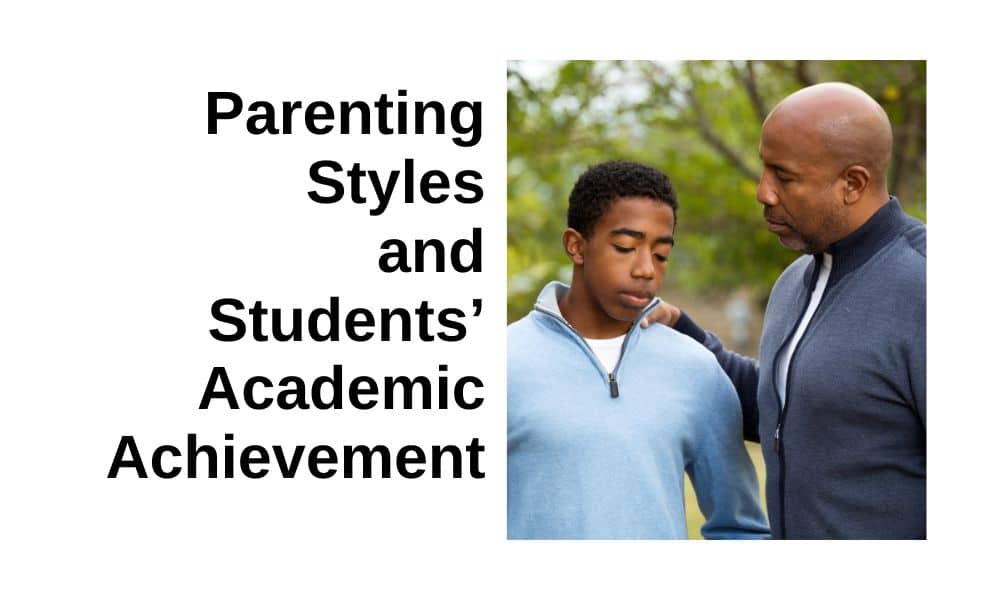
Parents, teachers, and researchers alike are interested in promoting children’s academic competence. Academic achievement has been linked to many factors. This article discusses the role of parenting styles in students’ academic achievement.
Types of parenting styles
Parenting styles can be defined as a pattern of behaviors, attitudes, and approaches a parent uses when interacting with and raising their child. Researchers have identified four main types of parenting styles that take a unique approach to raising children (Sanvictores & Mendez, 2022):
- Authoritarian
- Authoritative
- Permissive
- Uninvolved
Authoritarian parents are extremely rigid and use strict rules to control their children. The child has little to no room for negotiations, and the rules are usually not explained. They expect their children to uphold these standards while making no errors. Mistakes generally lead to punishment. Many parents are distant and demanding, which leaves their children struggling with mental health and self-esteem issues.
Authoritative parenting is characterized by reasonable demands and high responsiveness. While authoritative parents might have high expectations for their children, they also give them the resources and support needed to succeed. Parents who exhibit this style listen to their kids and provide love, warmth, limits, and fair discipline. Authoritative parenting results in children who are confident, responsible, and able to self-regulate.
Permissive parents tend to be warm and nurturing and usually have minimal expectations. They impose limited rules on their children. Communication remains open, but parents allow their children to figure things out for themselves. These low levels of expectation usually result in rare uses of discipline. They act more like friends than parents.
Uninvolved parents typically stay out of the way of their children, who they give a lot of freedom. They fulfill the child’s basic needs while remaining detached from their child’s life. An uninvolved parent does not utilize a particular disciplining style and has limited communication with their child. They tend to offer little nurturing while having little or no expectations of their children.
Studies on parenting styles and academics
Nyarko (2011) conducted a study to determine the influence of parental authoritativeness on adolescents’ academic achievement. The results show that the authoritativeness of both mothers and fathers positively relates to their children’s academic achievement.
In a comprehensive meta-analysis, Pinquart (2016) integrated the results of 308 empirical studies on associations of general parenting dimensions and styles with academic achievement of children and adolescents, assessed via grade point average or academic achievement tests. This thorough analysis provides a robust understanding of the relationship between parenting styles and academic achievement.
Parental responsiveness (warmth), behavioral control, autonomy granting, and an authoritative parenting style were associated with better academic performance – both concurrently and in longitudinal studies – although these associations were small in a statistical sense. Parental harsh control, psychological control, as well as neglectful, authoritarian, and permissive parenting styles were related to lower achievement with small to very small effect sizes.
Pinquart concluded that associations of academic achievement with general parenting dimensions/styles tend to be smaller than associations of school-specific parental involvement.
Based on a large sample survey of middle-school students in China, Yang and Zhao (2020) categorized parenting styles as authoritative, permissive, authoritarian, and neglectful (uninvolved).
The findings are as follows: the parenting styles of Chinese parents are predominantly authoritarian and neglectful, and parents of higher social classes tend to adopt the permissive parenting style. However, the authoritative parenting style is more conducive to improving children’s academic performance. Parenting style has a greater effect on children from disadvantaged backgrounds, and the parenting styles of mothers play a more vital role in their children’s academic performance than do the parenting styles of fathers.
Conclusion
Research findings highlight the importance of adopting an authoritative parenting style, which has been shown to be more conducive to improving children’s academic performance. Parents should be aware of the different parenting styles and their impact on academic outcomes and consider adopting a more authoritative approach to parenting.
Edublox offers cognitive training and live online tutoring to students with dyslexia, dysgraphia, dyscalculia, and other learning disabilities. Our students are in the United States, Canada, Australia, and elsewhere. Book a free consultation to discuss your child’s learning needs.

References:
Nyarko, K. (2011). The influence of authoritative parenting style on adolescents’ academic achievement. American Journal of Social and Management Sciences, 2(3): 278-82.
Pinquart, M. (2016). Associations of parenting styles and dimensions with academic achievement in children and adolescents: A meta-analysis. Educational Psychology Review, 28(3): 475–93.
Sanvictores, T., & Mendez, M. D. (2022). Types of parenting styles and effects on children. National Library of Medicine.
Yang, J., & Zhao, X. (2020). Parenting styles and children’s academic performance: Evidence from middle schools in China. Children and Youth Services Review, 113.


